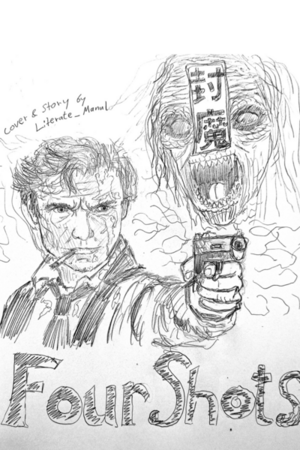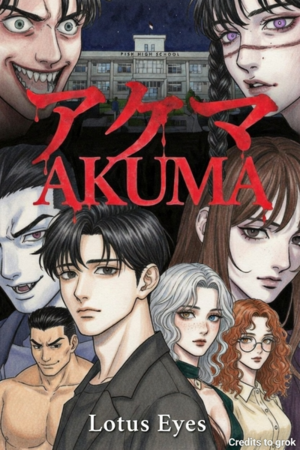Chapter 4:
1942 - May 19th - 11:04 AM
Four Shots
Dust swirled, the rails screeched, and the steam whistle shrieked as the locomotive slowly came to a halt at Rangoon station.
Professor Heinrich von Bütow wiped the sweat from his forehead with a handkerchief as he stepped onto the platform. The air was hot and stifling.
Beside him stood his partner, Dr. Weber, his linen suit wrinkled and already soaked through with sweat, a small swastika pinned to his lapel.
Waiting for them was a small contingent of Japanese soldiers.
Khaki uniforms, rifles slung over their shoulders, eyes of steel.
One of them, a sergeant with a rigid face, stepped forward and shouted something in Japanese.
Von Bütow nodded, murmuring a few broken words in the same language.
The soldiers remained expressionless until one made a curt gesture, ordering the arrivals to follow.
In the sweltering streets of Rangoon, the stench of death and disease hung heavy in the air.
Children with hollow faces lingered in the shadows of bombed-out houses, barefoot, their wide eyes silently fixed on the soldiers.
By the roadside lay half a dozen corpses, loosely covered with cloth. Thin as skeletons, most had likely died of hunger or illness only recently. Rats scurried across their limbs, undisturbed by the Japanese soldiers smoking nearby.
Professor von Bütow pressed the handkerchief harder against his nose.
Dr. Weber stumbled after him, his eyes wide with disgust.
He leaned toward the professor. “I… I can’t tell if it’s the heat making me sick or this smell.”
Von Bütow growled: “Get used to it. This isn’t a Sunday stroll through Berlin. What you smell is a dying empire. If you ask me, it’s about time the British were dragged back down to reality.”
Dr. Weber gave no reply.
At last they reached a Japanese administrative building: a former British colonial office with tall pillars, now draped with Rising Sun banners and guarded by two soldiers at the entrance.
They were led into an office where a Japanese officer in a spotless uniform sat behind a desk.
Professor von Bütow cleared his throat, trying a few broken words in Japanese.
“Watashi wa… anata no… kyōryoku…”
The officer raised a hand, smiling, and spoke unexpectedly, in halting, but recognizable German, as he bowed.
“Bitte, Herr Professor. We can speak in your language. Berlin… very beautiful city. I am Shōsa Tanaka.”
Von Bütow blinked in surprise, then bowed gratefully.
“Vielen Dank. That makes things easier. You know Berlin well?”
Tanaka nodded. “Ja. Was in Berlin… 1936 to 1938… with Ōshima Hiroshi. Strong city. But beer...” he pulled a face, “...not good. München better.”
Von Bütow laughed loudly, heartily while Dr. Weber sat stiff beside him, unsure what to make of the exchange.
“You’re right. Berlin can do many things, but not beer.”
For a brief moment the mood lightened, then Tanaka’s face grew serious again.
He poured water into three glasses and slid two across the table.
“So. You tell me. What expect to find… Myochaung? British… they stop digging there, many years ago.”
Von Bütow’s mouth twisted into a thin smile, disdain in his voice.
“The British...pah. They think of themselves as kings of archaeology. In Egypt, in India, perhaps. But here in Burma?” He snorted. “Here they never understood what was right under their noses.”
He took a sip, set the glass down hard.
“In Myochaung they saw only stones. I see an entrance.”
Tanaka raised an eyebrow. “Entrance… to what?”
Von Bütow pulled out a yellowed map, spread it on the table, and pointed to a spot.
“…To an ancient burial site. Older than the pagodas. Older than their history. A tomb sealed with rituals the British never understood.”
Tanaka frowned. “Burial site? Burma has thousands. Why you think… your eyes sharper than English?”
Dr. Weber cleared his throat, hesitated, then spoke up for the professor.
“We… we believe they were too distracted to see the pattern. You see, the finds don’t point to a simple tomb chamber, but to an entire… complex. A structure that was deliberately hidden.”
Von Bütow cut him off, his voice sharp: “In other words: where the British saw only a wall, we see a gate.”
Tanaka leaned back, studying them with narrow eyes.
“And why I waste soldiers, workers? For bones?”
Von Bütow leaned forward, his gaze hard. “Not just bones. Artifacts. Something hidden for centuries, because it was meant to stay hidden. Something the British can no longer claim. Glory that will not go to London, but to Tokyo... and Berlin.”
Weber nodded quickly, his voice feverish: “And scientifically… it would be a sensation! A symbol of what our two nations can achieve together.”
The officer leaned back, studying them.
For a few seconds there was silence, only the fan clattering above their heads.
Then the Japanese man slowly folded his hands, eyes sharp as a blade.
“Gut. You get support. But… you report everything. Verstanden?”
Von Bütow held his gaze. “Naturally.”
The officer gave a curt nod, then stood.
“I make sure, workers ready. Soon.”
Von Bütow rose as well, drained his glass in one swallow, and set it back on the table with a bang.
Then he bowed, and kicked Dr. Weber’s leg until he did the same.
“Arigatō… gozaimass,” he said with a heavy German accent, and together, they left the office.
Outside, the air was heavy with heat and the stench of war, but for the two Germans it suddenly smelled of promise, and Professor von Bütow’s lips curled into the faintest smile.
At last, the tomb would be opened.




Please sign in to leave a comment.